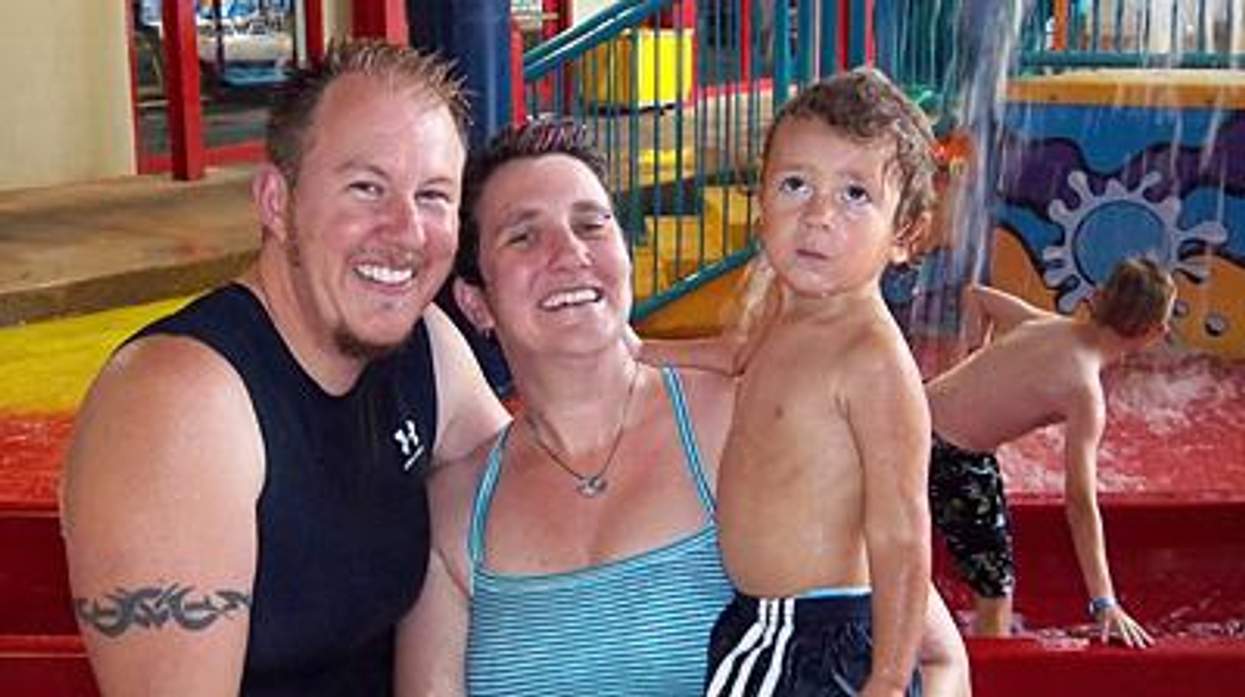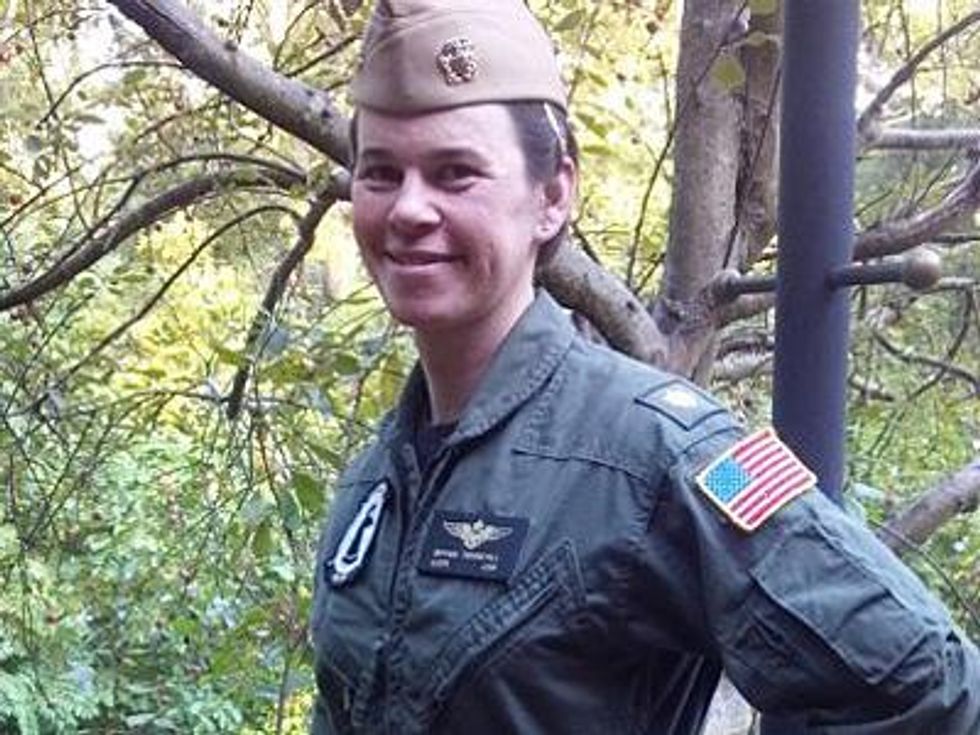Toni Blessing served eight years as a petty officer in the U.S. Navy, and he loved his job. He would also love to re-enlist, not only for the camaraderie but also for the steady paycheck and reliable benefits. That last part is especially important because Blessing and his partner are now raising a son and could certainly use the consistent health insurance.
When Blessing left the service in December 2004, fellow crewmen referred to him as "the ideal sailor," Blessing said, and he boasted a stellar service record. During his exit interview, Blessing's commanding officer said he couldn't understand why someone like him was getting out of the service and asked for an explanation.
"I told him I'm transgender, and unfortunately the military sees that as a problem," said Blessing. "I need to live my life as who I am, and I can't be me and be in the Navy."
As the rest of the country commemorates the first year of open service by gay, lesbian and bisexual service members, transgender soldiers still serve in silence. While "don't ask, don't tell" repeal opened the door for LGB service members, the U.S. military considers transgender identity to be a mental health disorder that makes one ineligible to serve.
Despite these hurdles, transgender people do manage to serve in our nation's Armed Forces. The Advocate spoke to several of these soldiers, on condition of anonymity, to protect their continued service.
Andy is a trans man and Army Major who is on active duty in the Active Guard Reserves. Military policy means he has "to work so hard to have to be a female, and it would be so much easier to just be who I am, and be a guy."
But it's not like the institution is entirely oblivious to what's happening. Those who've successfully served while trans say there is a difference, for example, in how gender non-conforming women are treated from gender non-conforming men in the military.
"I think there's more of a turning of a blind eye," said Andy. "Because people kind of just identify you as a butch lesbian, or just an effeminate man that's gay. It's OK to be gay [since DADT was repealed], so it's easier to blend in."
"I'd like to say that there've been more positive [attitudes] toward any aspect of feminine-based personality traits [since DADT repeal]," said Jennifer, a trans woman and Army Sergeant who is serving in the southeastern U.S. "But when it comes to the military, it's still very much a hypermasculine, macho-based ideology."
Blessing, for his part, was out as trans to several of his fellow sailors. When he began taking testosterone and growing facial hair a few months before his separation, he asked his shipmates to help teach him how to shave. They happily obliged, he said. "We had a shave party with all these enlisted Navy guys, in a house on base," recalls Blessing.
While some service members risked coming out as trans to their fellow soldiers, most wouldn't suggest taking that chance. The National Center for Transgender Equality recommends that trans service members understand the consequences if they choose to come out while in uniform.
 Pictured: Brynn Tannehill, a former lieutenant commander in the Navy and a trans woman
Pictured: Brynn Tannehill, a former lieutenant commander in the Navy and a trans woman
Resources to help transgender service members navigate that hypermasculine environment do exist, and many reported finding allies within their platoons and the larger veteran community. The most frequently mentioned resources, though, included Servicemembers Legal Defense Network and OutServe, which was once a secret member organization advocating for silenced gay and lesbian servicemembers. Now, OutServe hosts a similarly secretive group of transgender members, in addition to out and proud LGB soldiers. According to OutServe magazine, that group now boasts more than 70 members -- about 1% of the organization's total membership.
While current military law forbids them from doing so -- and pushes trans service members into secret organizations -- many who spoke with The Advocate said that they would prefer to be out on the job, and that it would allow them to be better soldiers.
"I would be able to perform my job much better, without holding back anything," said Jennifer. "There's no question about running away, or escaping, or trying to find an easy way out. It's simply wanting to be myself, while continuing to serve and be the best that I can be where I'm at."
The Department of Defense instructions regarding medical standards list several trans-related procedures as disqualifying acts. Section 6130.03 mentions "history of major abnormalities or defects of the genitalia, such as change of sex [and] hermaphroditism." The same regulations also reference disqualifying mental health conditions, including "current or history of psychosexual conditions, including but not limited to transsexualism [and] transvestism." The regulations also forbid service by those with "sexual and gender identity disorders," as defined in the American Psychiatric Association's Diagnostic and Statistical Manual.
Previous drafts of the DSM categorized transgender identity as "gender identity disorder," though that language will be revised in the DSM-V, slated for publication in Spring 2013. The revised manual will refer to transgender identities as "gender dysphoria," removing the pathologizing language referring to a "disorder."
Military regulations haven't caught up to the revised DSM guidelines, though, said Autumn Sandeen, a transgender activist and veteran who served 20 years in the Navy. Sandeen said military policy often lags behind current medical understanding, pointing out that military regulations listed homosexuality as a mental illness until 2009, more than two decades after the DSM removed same-sex attraction from its classification as a psychological disorder.
Yet any service members wanting to seek psychological or medical counsel for their gender issues cannot do so through military health care providers. David McKean, head of the SLDN, said most military psychologists have little or no experience with transgender people or gender dysphoria. More importantly, there is no presumption of doctor-patient confidentiality within the military medical complex. Military doctors and psychologists are free to report a soldier's gender issues to that soldier's chain of command, which could quickly lead to discharge proceedings. And should a service member seek medical care outside the military complex, they are in violation of the Uniform Code of Military Justice and could be punished. The UCMJ also strictly regulates clothing and gender presentation, and anyone deemed to be "cross-dressing," even a man wearing an earring, can be reprimanded or discharged under the gender identity provision.
Brynn Tannehill, a former lieutenant commander in the Navy and a trans woman, may have found the closest feasible option to open trans service. Tannehill is a defense contractor, who transitioned after she left the service while she was between jobs. She now works with civilian leadership and uniformed officers, some of whom are aware of her trans identity.
"The team that I work with, it's an open secret that I'm trans," said Tannehill, who also writes for OutServe magazine and serves as OutServe's transgender blogger. "And it hasn't been an issue for as long as I've been here. It hasn't come up at all, and [even when] the Department of Defense leadership was here, it has not come into play, that I can tell, so far in the six months that I've been here."
Tannehill -- and several active-duty transgender soldiers -- are ultimately optimistic about the potential for open service in the military. "I suspect that... integrating trans people who make an effort to conform is not going to be nearly as difficult as people would believe."
It took 17 years to wipe DADT off the books. How much longer will it take until the military embraces all Americans who have a desire to serve, regardless of race, sex, sexual orientation, or gender identity? That's up to the military brass who use the same rationale to bar transgender service that they once did to bar gay and lesbian service, racially diverse service, and women in uniform: it will harm unit cohesion, retention efforts, and order within the ranks.


 Pictured: Brynn Tannehill, a former lieutenant commander in the Navy and a trans woman
Pictured: Brynn Tannehill, a former lieutenant commander in the Navy and a trans woman


































































Charlie Kirk DID say stoning gay people was the 'perfect law' — and these other heinous quotes